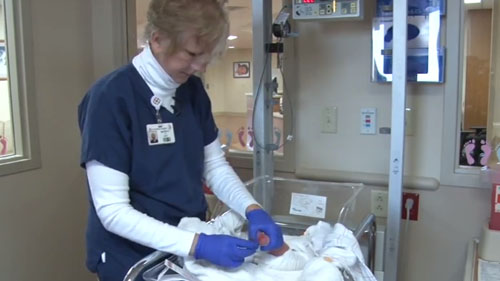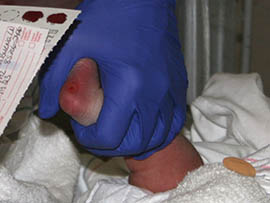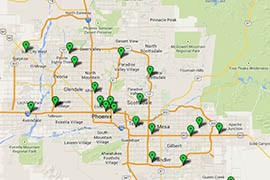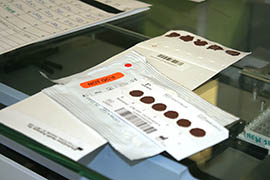Cronkite News has moved to a new home at cronkitenews.azpbs.org. Use this site to search archives from 2011 to May 2015. You can search the new site for current stories.
State wins national award for newborn screening turnaround
PHOENIX – Counting 10 fingers and 10 toes doesn’t begin to tell parents and doctors whether a baby is healthy. With that in mind, state health officials screen blood samples from newborns to identify hidden health problems that can prove fatal.
“If you don’t know that the baby has that disorder quickly, bad things can happen really fast – within days,” said Will Humble, director of the Arizona Department of Health Services.
But Humble learned last year that screenings often took too long to help newborns facing critical health problems, in large part because of delays getting blood samples from hospitals to the Arizona State Laboratory. That was after an investigation by the Milwaukee Journal Sentinel pointed to delays in newborn screening around the country.
Today, nearly all newborn blood samples make it from hospitals to the state lab in three days or less thanks to an initiative dubbed the Transit Time Project.
The March of Dimes recently honored Humble’s efforts to speed up newborn screenings and build transparency into the process, presenting him with its first-ever Newborn Screening Quality Award.
“It really does make a difference in saving lives,” said Edward McCabe, the organization’s chief medical officer.
A newborn screening, the first of two required by the state, starts with a poke to the baby’s heel and applying blood to a newborn screening card with special filter paper that will be sent to the state lab once it dries for at least three hours. It’s generally done 24 to 36 hours after birth.
The state lab tests samples for 28 genetic disorders, a process that takes five days. If a sample shows an abnormality, it’s tested again before parents are notified.
When health officials found that blood samples from babies born between Friday evening and Sunday weren’t being picked up by courier services until Monday, Humble’s department engaged a courier service that worked Friday and Saturdays.
“Courier service is very important because it goes out to everyone in the state,” said Celia Nabor, project manager for the department’s Office of Newborn Screening. “We wanted to make sure that all hospitals had equal access to a courier service that was going to help them get their samples here on time.”
New webinars helped hospitals learn about the courier service, the department’s goal of speeding up screenings and a hospital’s responsibilities.
“We identified very early that education and outreach were going to be a key piece to the success of this project,” Nabor said.
The department also promised transparency in the newborn screening process and created a website allowing anyone to see how individual hospitals are performing.
In July, the department announced that 39 of the state’s 43 birthing hospitals had met its goal of getting 95 percent of newborn blood samples to the state lab in three days or less. It presented each with an award.
Among the winners was Mountain Vista Medical Center in Mesa, where according to the Milwaukee Journal Sentinel investigation 42.98 percent of samples took five or more days to reach the state lab in 2012. As of August, 98 percent of that hospital’s samples reached the state lab in less than three days, according to the state.
Kevin Brown, director of Mountain Vista’s lab, said the hospital changed its operations to get samples to his staff faster, including dedicating a person to deliver specimens internally.
“It was quite a good feeling seeing where we were and where we had gone,” Brown said. “This is where we want to be from here on out.”













